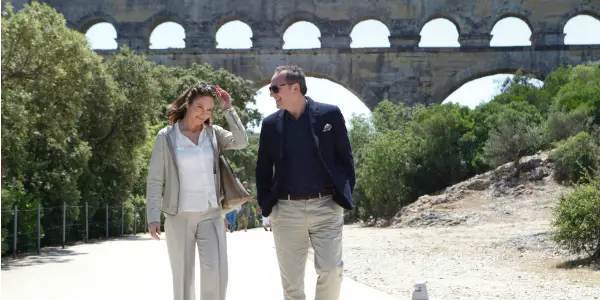PARIS CAN WAIT: Intolerable Wandering

Alex is a film addict, TV aficionado, and book lover.…
As one of Hollywood’s biggest families, it’s hardly a surprise that another Coppola is behind Paris Can Wait. That is, until you learn that it’s Eleanor, wife of Francis Ford Coppola, waving off ageism to write and direct her first narrative feature at the age of 80.
The wife, mom, sister-in-law, grandmother (you get the picture) of filmmakers may not be a newcomer to the business, but her previous movies have all been documentaries, making Paris Can Wait a significant change. Still, it’s a welcome change, as her sporadic projects have been well-received in the past. She won an Emmy for Hearts of Darkness: A Filmmaker’s Apocalypse, and she’s dipped her toes in a wide range of roles behind the camera.
It’s hard to imagine someone more prepped and ready to lead a film, and considering that she based the story on a real-life trip through France, it seems like a surefire pleasure. That’s what makes the utter banality of Paris Can Wait all the more surprising and infuriating.
Yes, Paris Can Wait
The sinking feeling that comes with watching Paris hits the viewer early, as Diane Lane’s Anne gazes out on a stunning view of Cannes. She’s in a high-end hotel with breakfast laid out on the balcony and her husband (Alec Baldwin) is taking a business call inside. She’s the picture of privileged neglect, efficiently but mechanically established. Moments later, she must defend ordering a hamburger and a sandwich through room service, but the questioning never escalates into an actual fight, much like the film never escalates into real drama.

This setup is intended to launch a journey of self-discovery, but the problems facing Anne never have any consequential stakes. She is led on a meandering road trip by her manic pixie Frenchman (Arnaud Viard) with no conflict to rub against. Despite constantly saying that she needs to get to Paris, she actually doesn’t. There’s no time-sensitive reason for her arrival, and whatever is going on between her and Viard’s flirty stranger never feels significant enough to change her.
In the imagined breadth of this character’s life, the film takes place in a frivolous detour. Most storytellers avoid insignificant periods like this because it’s hard to build a captivating arc when nothing is happening. And nothing much is happening in Paris Can Wait, which proves to be a fatal, tiresome flaw.
Uninspiring Travelogue
To a certain extent, the film’s slight plot is intentional. It’s as much about the joys of travel as it is about character or story, so one would expect to be distracted by great food, beautiful landscapes, and jubilant company. That’s partially why Viard’s character is forgivable; he’s an impossibly charming and attentive tour guide because the film is a bit of a fantasy, the kind where car trouble leads to the perfect picnic instead of tired bickering.
Again, though, the film fails the follow through on its aspirations. The pleasures of France are paraded in front of the audience without any seductive style to actually sell you on it. The presentation is bland on every front, as if Coppola expects beautiful things to speak for themselves.

But film allows for so much more, and comparisons to any number of effusive odes to pleasure shows how much Paris Can Wait underperforms. Think about the prawn scene in Luca Guadagnino’s I Am Love. When Tilda Swinton bites into that delectable morsel, the film focuses on her slide into otherworldly bliss. That’s because the scene is not about the food; it’s about how the food makes her feel. It’s her utter joy that makes me desperately want prawn whenever I see it, and I hate shellfish.
Inspiring desire, heightening it, making the beloved thing seem mouthwateringly close is what film is capable of, and Paris Can Wait doesn’t do anything like that. It settles for pretty when it should go for stunning, and the sense that you’re being shortchanged is hard to shake.
Buildup To Disappointment
All of this makes for a forgettable movie, and that’s seemingly what Paris is coasting towards until it attempts a terribly misjudged ending. A detour requested by Anne late in the film is so out of character that it arouses both suspicion and hope. It promises that something is finally going to happen, but what comes is so unearned that the whole sequence feels like cringe-worthy artifice.

Perhaps if the characters had had more meaningful interactions previously or if the drama had been based on something deeper, then this escalation wouldn’t have felt so awkward. As is, it’s like a scene from a different movie, and it’s dropped like it didn’t happen. No payoff, no nothing. In fact, the entire film builds to a stunning letdown, and it’s almost impossible to tell if it’s because the film never became lightheartedly charming or if it attempted and failed to coagulate into real drama.
What is clear is that the film never presented Anne with a true problem, despite inserting inconveniences and rote character flaws. Instead, it quickly solved everything for her, leaving Lane in the awkward position of making a thoroughly passive character interesting. Lane turns on the charm, and with Viard they achieve a few fleeting moments of pleasure, but they can’t hide how jaw-droppingly little happens.
Conclusion
There’s a way, many ways, actually, to make a satisfying film about a lighthearted romp, but Paris Can Wait never finds any of these paths. Its lack of style and subtlety lures the audience into boredom only to sucker punch them with saccharine, half-hearted plot points. Instead of leaving you inspired or whimsical, you’re apt to walk away shaking your head, mystified at how it all went so wrong.
What do you like in your travelogue films?
Paris Can Wait is in theaters now in the U.S. For international release dates, click here.
Does content like this matter to you?
Become a Member and support film journalism. Unlock access to all of Film Inquiry`s great articles. Join a community of like-minded readers who are passionate about cinema - get access to our private members Network, give back to independent filmmakers, and more.
Alex is a film addict, TV aficionado, and book lover. He's perfecting his cat dad energy.













